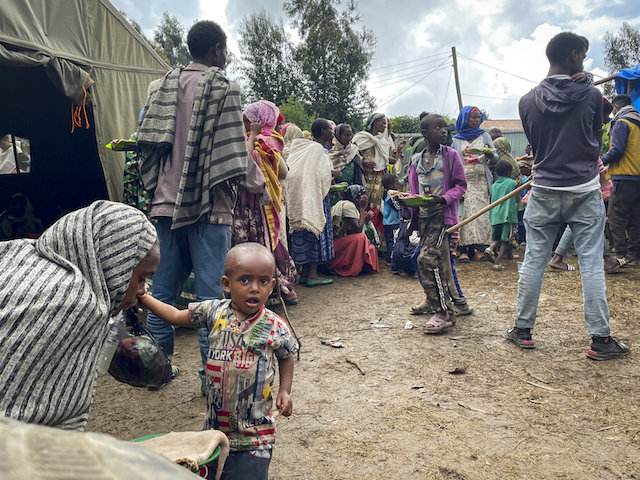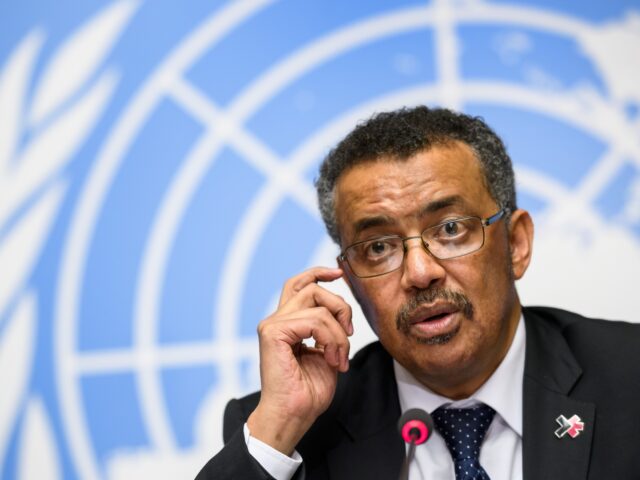The director-general of the World Health Organization (W.H.O.), Tedros Adhanom Ghebreyesus, accused heads of state on Wednesday of racism for failing to address the ongoing “manmade” humanitarian disaster in his native Ethiopia, saying the Russian invasion of Ukraine is getting more attention due to the skin color of Ethiopians.
Ethiopia descended into civil war in November 2020 between the ruling government – led by ethnic Oromo Abiy Ahmed, a Nobel Peace Prize winner – and the Tigray People’s Liberation Front (TPLF), a Marxist former ruling party that Abiy designated a terrorist organization last year. Tedros, an ethnic Tigray, served in multiple roles in TPLF governments before being elected to run the W.H.O., including health minister and foreign minister.
As part of that war, the Abiy government has blockaded the northern Tigray region, affecting not only TPLF militia members but the general civilian population of the region. The blockade has resulted in mass starvation and a near-total absence of health care, medicine, access to electricity, or other basic needs. Abiy has faced accusations of “ethnic cleansing,” including from Secretary of State Antony Blinken, while the TPLF has similarly faced accusations of mass rape and killing against other ethnic minorities, most prominently the Amhara group.
The Oromo are the most populous ethnic group in the country, though the Tigray and Amharas make up significant minorities. Tigray is believed to be home to about 7 million people, six million of which are facing starvation and a complete lack of access to humanitarian services, Tedros said on Wednesday.
Despite the announcement of a truce temporarily ending active hostilities in March, the government has not lifted the blockade on Tigray, leaving civilians to contend with what human rights experts have decried as a famine.
Tedros made the remarks on Wednesday during a W.H.O. press conference intended to address the Chinese coronavirus pandemic, increasing confirmed cases of monkeypox, and general public health concerns around the world.
“In the Ethiopian region of Tigray, the drought is compounding a man-made catastrophe for six million people who have been under siege from Ethiopian and Eritrean forces for 21 months, sealed off from the outside world with no telecommunications, no banking services and very limited electricity and fuel,” Tedros told journalists at the briefing. “As a result, the people of Tigray are facing multiple outbreaks of malaria, anthrax, cholera, diarrhoea and more. This unimaginable cruelty must end. The only solution is peace.”
Tedros repeated a comparison that he initially made in April between the global panic regarding the situation in Ukraine and that in Tigray and other areas populated by non-white majorities, arguing that racism was driving the apathy towards what he described as a far worse situation in Ethiopia.
“In terms of humanitarian crisis, I can tell you that the humanitarian crisis in Tigray is more than Ukraine, without any exaggeration,” Tedros told reporters. “And I said it many months ago, maybe the reason is the colour of the skin of the people in Tigray. I haven’t heard in the last few months, several months now, even a head of state talking about the Tigray condition anywhere, in the developed world especially.”
“Why? I think we know but the only thing we’re asking is can the world come back to its senses and uphold humanity?” he asked, implying that racism had silenced the world on the situation in Ethiopia. “If it’s the worst humanitarian crisis, and I’m saying nowhere on Earth six million people are sealed off, nowhere, from basic services, from their own money, from telecoms, from food, from medicine. This is the worst disaster on Earth as we speak.”
In the comments Tedros alluded to “many months ago,” the W.H.O. chief lamented not only the apathy towards Ethiopia, but towards other crises occurring in areas where majority-white populations do not live.
“I don’t know if the world really gives equal attention to black and white lives,” he said in April. “I said it last week: the whole attention to Ukraine is very important, of course, because it impacts the whole world but [not] even a fraction of it is being given to Tigray, Yemen, Afghanistan, Syria and others.”
“And I need to be blunt and honest that the world is not treating the human race the same way,” he continued. “Some are more equal than others. And when I say this, it pains me. Because I see it.”
This week, Tedros lamented that the Abiy government has allowed “nowhere near enough” humanitarian aid into Tigray despite the truce and has blocked civilians from accessing their own money in banks, in addition to making routine vaccinations for children impossible and curtailing the food supply.

Displaced Amharas from different villages now controlled by Tigrayan forces in the North Gondar zone, queue to receive food at a kindergarten school housing the internally-displaced, in Debark, in the Amhara region of northern Ethiopia Wednesday, Aug. 25, 2021. (AP Photo)
“Except the food aid, which is trickling, and some medicines, which is trickling – no immunization of kids by the way, no vaccination at all, the siege by both Eritrean and Ethiopian forces continues,” Tedros detailed. “That’s the status quo. The status quo continues except some food delivery.”
The W.H.O.’s assistant director-general for emergencies, Dr. Ibrahima Socé Fall, blamed the Ethiopian government for “big delays” in W.H.O. humanitarian aid entering Tigray.
“If you look at the level of disruption and lack of access to the health services, where health workers were not paid, it will take months and months for the system to recover. In the meantime, we have already lost so many people,” Socé Fall said, “So, the recovery will take very, very long and we are not even yet filling all the needs even to talk about recovery. Making sure that we have full access and a steady supply is permitted without any restriction is vitally important.”
Tedros largely abstained from commenting on the Ethiopian civil war in its early days in late 2020, when the Abiy government accused TPLF militia fighters of attacking a military base, prompting the targeting of Tigray civilians. The Ethiopian government nonetheless accused Tedros of working behind the scenes to aid the Tigray rebels. Anonymous Abiy officials claimed that Tedros was “fully engaged in soliciting diplomatic and military support” for the TPLF and using the W.H.O. to seek alliances for the TPLF abroad, accusations Tedros denied and no one corroborated with on-the-record information.
Tedros said in January that the W.H.O. had repeatedly attempted to reach out to the Abiy government to send humanitarian aid to Tigray but received “no permission.”
“Humanitarian access even in conflict is the basics. Even in Syria, we have access, during the worst of conflicts in Syria. In Yemen, the same, we have access. We deliver medicine. Here [in Tigray] nothing, it’s a complete blockade,” Tedros said at the time.
In March, following the signing of a truce between the Abiy government and the TPLF, Tedros denounced that Abiy was still starving the Tigrayans with a blockade.
Abiy’s government called for a permanent ceasefire agreement on Wednesday, which the TPLF rejected on the grounds that any such deal would require an end to the blockade on Tigray.
“They [the Ethiopian government] have openly defied their oft-repeated promise to take measures aimed at creating conducive environment for peaceful negotiations such as ensuring unfettered humanitarian access and restoration of services to Tigray,” TPLF spokesman Getachew Reda said in a statement on Twitter, according to the Agence France-Presse (AFP).

COMMENTS
Please let us know if you're having issues with commenting.